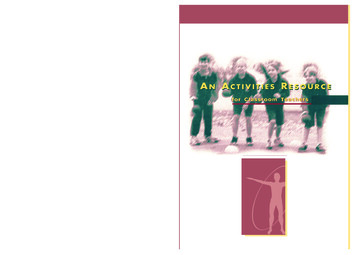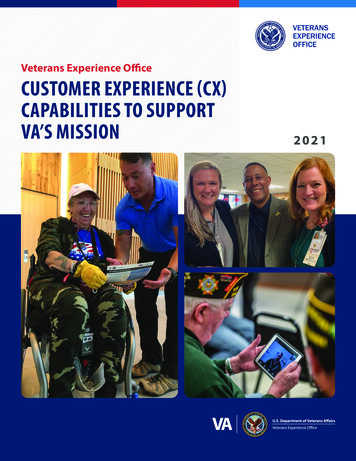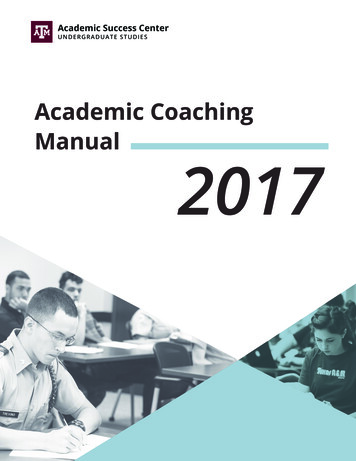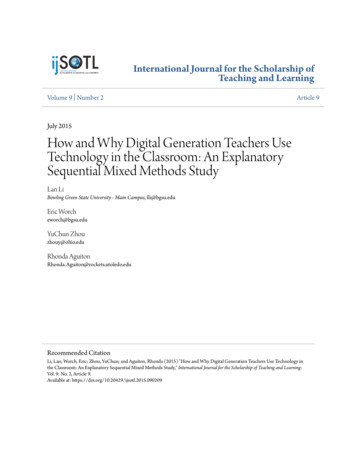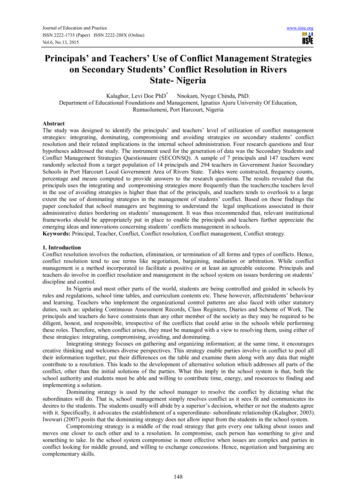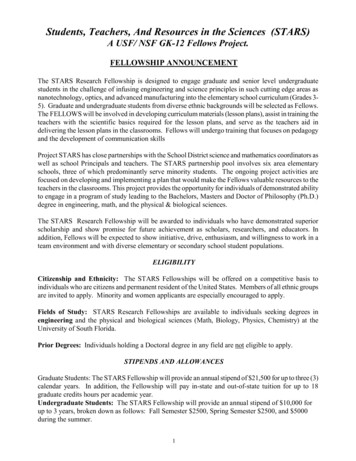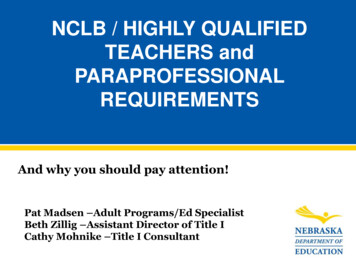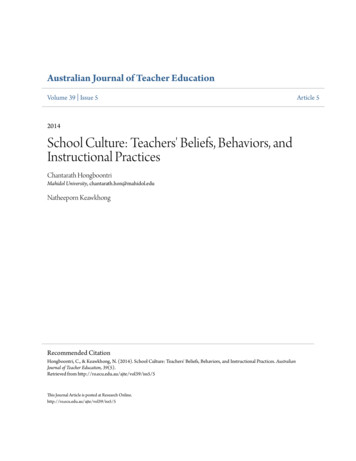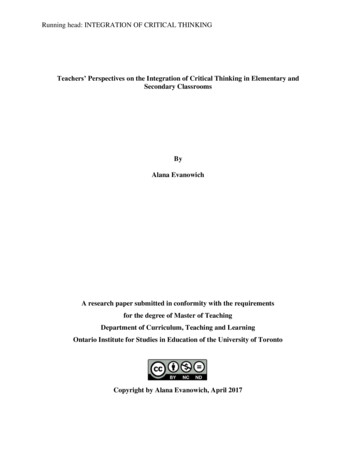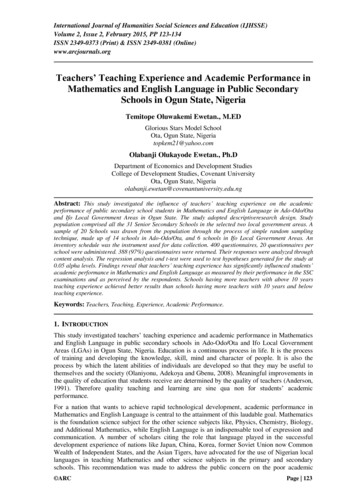
Transcription
International Journal of Humanities Social Sciences and Education (IJHSSE)Volume 2, Issue 2, February 2015, PP 123-134ISSN 2349-0373 (Print) & ISSN 2349-0381 (Online)www.arcjournals.orgTeachers’ Teaching Experience and Academic Performance inMathematics and English Language in Public SecondarySchools in Ogun State, NigeriaTemitope Oluwakemi Ewetan., M.EDGlorious Stars Model SchoolOta, Ogun State, Nigeriatopkem21@yahoo.comOlabanji Olukayode Ewetan., Ph.DDepartment of Economics and Development StudiesCollege of Development Studies, Covenant UniversityOta, Ogun State, stract: This study investigated the influence of teachers’ teaching experience on the academicperformance of public secondary school students in Mathematics and English Language in Ado-Odo/Otaand Ifo Local Government Areas in Ogun State. The study adopted descriptiveresearch design. Studypopulation comprised all the 31 Senior Secondary Schools in the selected two local government areas. Asample of 20 Schools was drawn from the population through the process of simple random samplingtechnique, made up of 14 schools in Ado-Odo/Ota, and 6 schools in Ifo Local Government Areas. Aninventory schedule was the instrument used for data collection. 400 questionnaires, 20 questionnaires perschool were administered. 388 (97%) questionnaires were returned. Their responses were analyzed throughcontent analysis. The regression analysis and t-test were used to test hypotheses generated for the study at0.05 alpha levels. Findings reveal that teachers’ teaching experience has significantly influenced students’academic performance in Mathematics and English Language as measured by their performance in the SSCexaminations and as perceived by the respondents. Schools having more teachers with above 10 yearsteaching experience achieved better results than schools having more teachers with 10 years and belowteaching experience.Keywords: Teachers, Teaching, Experience, Academic Performance.1. INTRODUCTIONThis study investigated teachers‟ teaching experience and academic performance in Mathematicsand English Language in public secondary schools in Ado-Odo/Ota and Ifo Local GovernmentAreas (LGAs) in Ogun State, Nigeria. Education is a continuous process in life. It is the processof training and developing the knowledge, skill, mind and character of people. It is also theprocess by which the latent abilities of individuals are developed so that they may be useful tothemselves and the society (Olaniyonu, Adekoya and Gbenu, 2008). Meaningful improvements inthe quality of education that students receive are determined by the quality of teachers (Anderson,1991). Therefore quality teaching and learning are sine qua non for students‟ academicperformance.For a nation that wants to achieve rapid technological development, academic performance inMathematics and English Language is central to the attainment of this laudable goal. Mathematicsis the foundation science subject for the other science subjects like, Physics, Chemistry, Biology,and Additional Mathematics, while English Language is an indispensable tool of expression andcommunication. A number of scholars citing the role that language played in the successfuldevelopment experience of nations like Japan, China, Korea, former Soviet Union now CommonWealth of Independent States, and the Asian Tigers, have advocated for the use of Nigerian locallanguages in teaching Mathematics and other science subjects in the primary and secondaryschools. This recommendation was made to address the public concern on the poor academic ARCPage 123
Temitope Oluwakemi Ewetan & Olabanji Olukayode Ewetanperformance of students in Senior Secondary Certificate Examination (SSCE) in Mathematics andEnglish Language in recent years. This recommendation has not been implemented till date andthe poor academic performance in these two key subjects has persisted.The controversy over the falling standards of education in Nigeria has been on the front burner ofnational discourse over the past decades and it is apparent that the debates will continue for sometime to come. Poor academic performance has been linked to several factors which include highteacher-student ratio, shortage of good teaching staff, poor quality of educational leadership,political instability and politicization of educational programmes, automatic promotion, age of thelearners, and inadequate essential physical facilities and equipment (Ewetan, 2010; Akinwunmiand Odunsi, 2008).Information gathered through the National Bureau of Statistics shows that as at 2008, there were14,829 secondary schools in Nigeria. Out of this number 2,930 secondary schools or 19.76% werefrom South West while 508 secondary schools or 17.34% were from Ogun State. One of theessential ingredients in developing good schools with high academic performance is regularsupply of human and material resources. There are several states in Nigeria whose school teachersat the primary and secondary level are so unqualified that the percentage could be as high aseighty percent (Adesina 1986). Thus the high percentage of unqualified teachers in publicsecondary school is a major factor responsible for the poor students‟ academic performance. Amajor feature of this poor academic performance is the dismal performance in Mathematics andEnglish Language in the Senior Secondary Certificate Examination (SSCE) in Nigeria in therecent years which has been linked to decline in the quality of teaching and learning (Ewetan,2010; Akinsolu, 2010; Daso, 2013, Chhinh and Tabata, 2013).Better students‟ results are the mainindicator of the experience and effectiveness of teachers. In developing and developed countriesthe teacher factor has been linked to low achievement in Mathematics and English Language(Akpo, 2012; TIMSS, 2002; Afrassa and Peeves, 1999; Jacob and Lefgen, undated).Considering the foregoing, this study seeks to investigate the relationship between teachervariables such as years of experience, availability of experienced teachers, and students‟ academicperformance in Mathematics and English Language in public secondary schools in Ado-Odo/Otaand Ifo Local Government Areas in Ogun State, Nigeria.2. RESEARCH QUESTIONSIn addressing the research problem, this study seeks to provide answers to the following researchquestions;What is the status of teachers in terms of qualifications in the selected public secondaryschools in Ado-Odo/Ota and Ifo Local Government Areas in Ogun State?How are teachers distributed on the basis of teaching experience in the selected publicsecondary schools in Ado-Odo/Ota and Ifo Local Government Areas in Ogun State?What is the level of students‟ academic performance in the selected public secondary schoolsin Ado-Odo/Ota and Ifo Local Government Areas in Ogun state?What is the relationship between teachers‟ years of experience and students‟ academicperformance in the selected public secondary schools in Ado-Odo/Ota and Ifo LocalGovernment Areas of Ogun State?What is the relationship between teachers‟ development programmes and students‟ academicperformance in the selected public secondary schools in Ado-Odo/Ota and Ifo LocalGovernment Areas of Ogun State3. OBJECTIVES OF THE STUDYThe objectives of this study are:To find out the status of teachers in terms of qualifications in the selected public secondaryschools in Ado-Odo/Ota and Ifo Local Government Areas of Ogun StateTo find out the distribution of teachers on the basis of teaching experience in the selectedpublic secondary schools in Ado-Odo/Ota and Ifo Local Government Areas of Ogun StateInternational Journal of Humanities Social Sciences and Education (IJHSSE)Page 124
Teachers’ Teaching Experience and Academic Performance in Mathematics and English Languagein Public Secondary Schools in Ogun State, NigeriaTo find out the level of students‟ academic performance in the selected public secondaryschools in Ado-Odo/Ota and Ifo Local Government Areas in Ogun stateTo examine the relationship between teachers‟ years of experience and students‟ academicperformance in the selected public secondary schools in Ado-Odo/Ota and Ifo LocalGovernment Areas of Ogun StatTo examine the relationship between teachers‟ development programmes and students‟academic performance in the selected public secondary schools in Ado-Odo/Ota and Ifo LocalGovernment Areas of Ogun State4. LITERATURE REVIEWThe issue of teacher as a factor that affects students‟ academic performance has received a lot ofattention in the literature and findings have been mixed and inconclusive. A strand of theliterature revealed that a number of teacher variables which include years of teaching experience,level of educational attainment or academic qualifications, teacher development programmes,availability of qualified teachers, teacher-student ratio, teacher attitude, degree of job satisfaction,motivation and salary affect students‟ learning outcomes (Daso, 2013; Akpo, 2012; Odiri,2011;Ewetan, 2010; Akinsolu, 2010; Adesoji and Olatunbosun, 2008; Bressoux et al, 2008;Adeyemi, 2008; Abu and Fabunmi, 2005). Another strand of the literature found that a number ofteacher variables which include teacher years of experience, teacher academic attainment orqualifications, teacher-student ratio, and teacher development programmes had no significantinfluence on students‟ academic performance (Yara and Surumo, 2012; Ayodele and Ige, 2012;Zaku, 1983).Akpo (2012) examined the impact of teacher-related variables on students‟ junior secondarycertificate mathematics results in Namibia using questionnaire, multi-correlation and regressionanalysis and found that teacher educational qualifications, teaching experience, subjectspecialization, standards-based professional development, standard-based classroom activities,and classroom management beliefs are related to students‟ academic achievement in JSCMathematics. Similar study by Daso (2013), on teacher variables and senior secondary students‟achievement in Mathematics in Rivers State, Nigeria, reported that there is a significantrelationship between teachers‟ method of teaching, teachers‟ attitude, teacher quality andstudents‟ achievement in Mathematics. Akinsolu (2010) investigated teachers and students‟academic performance in Nigerian secondary schools and its implications for planning usingquestionnaire, Anova and Spearman Rank Correlation coefficient and found that teachers‟qualifications, years of experience, and teacher-student ratio were significantly related to students‟academic performance. In their study on “Student, Teacher and School Environment Factors asDeterminant of Achievement in Senior Secondary School Chemistry in Oyo State, Nigeria,Adesoji and Olatunbosun (2008), adopted an ex-post facto research type and used four sets ofinstruments. They found that 7.2% of the total effect on achievement in chemistry was accountedfor by all the seven predictor variables when taken together. It was also revealed that only fourvariables, school location, laboratory adequacy, teachers‟ attitude to chemistry teaching, andteachers‟ attendance at chemistry workshop had direct causal influence and significantlycontributed to the prediction of achievement in chemistry. In a similar study of the relationshipamong teacher variables and adult learners‟ academic performance in the part-time sub-degreeprogramme of the University of Ibadan in Nigeria, Abu and Fabunmi (2005) discovered that thereis a significant and positive relationship between teacher‟s qualification, age, years of experience,teacher-learners ratio, and adult learners‟ academic performance.Chhinh and Tabata (2003) in their study on the effects of selected teacher factors on theMathematics achievement of urban primary school pupils in the state of Cambodia, usedquestionnaires and achievement test to construct an index of academic performance. The resultsof the stepwise regression analysis revealed that teachers‟ economic status, their years of teachingexperience and job satisfaction have statistically significant relationships with the achievement ofthe pupils whose economic status had been held constant. However, these three teachers‟variables explain only about 20 percent of the variance in the pupil learning achievement. In asimilar study on the impact of different teacher and class characteristics on third graders‟International Journal of Humanities Social Sciences and Education (IJHSSE)Page 125
Temitope Oluwakemi Ewetan & Olabanji Olukayode Ewetanoutcomes in Germany, Bressoux et al (2008) found that teachers‟ training substantially improvesstudents‟ test scores in Mathematics, and small class is more beneficial to low-achieving studentswithin classes, and to all students in low achieving classes.In a study of the relationship between teachers‟ effectiveness and students‟ academic performancein public secondary schools in Delta State, Nigeria, Akiri and Ugborugbo (2009) usingcorrelation, simple regression, t-test, and single factor analysis of variance found that effectiveteachers produced better performing students. However the observed differences in students‟performance were statistically not significant. Adu and Olatundun (2007) in a study on teachersperception of teaching as correlate of students‟ academic performance in Oyo State, Nigeria,found that, the relationship between teachers‟ perception and students‟ academic performance ispositive and significant, and that qualification has no significant effect on students‟ performance.Abuseyi (2001) examined student and teacher related variables as determinants of secondaryschool student academic achievement in Chemistry in Epe and Ibeju-Lekki Local GovernmentAreas of Lagos State, Nigeria, using questionnaire, and adopted an ex-post facto design. He foundthat teacher age, teacher gender, qualifications, and experience had direct causal effect onstudents‟ achievement in Chemistry. Ayodele and Ige (2012) examined the rela
Teachers’ Teaching Experience and Academic Performance in Mathematics and English Language in Public Secondary Schools in Ogun State, Nigeria Temitope Oluwakemi Ewetan., M.ED Glorious Stars Model School Ota, Ogun State, Nigeria topkem21@yahoo.com Olabanji Olukayode Ewetan., Ph.D Department of Economics and Development Studies
